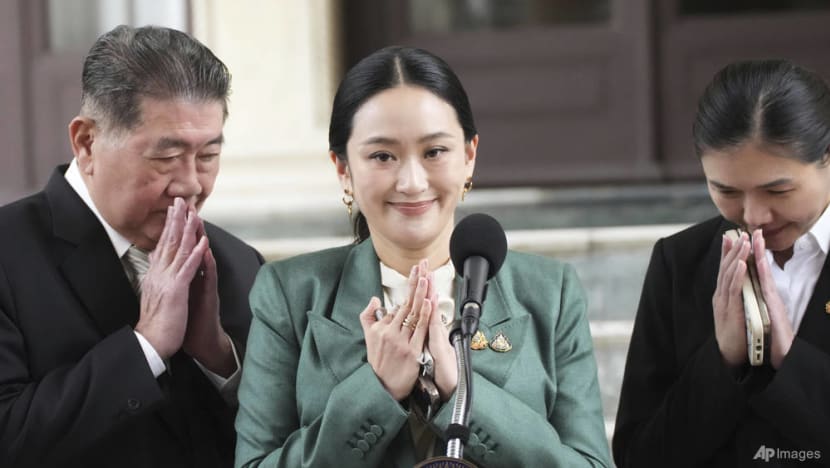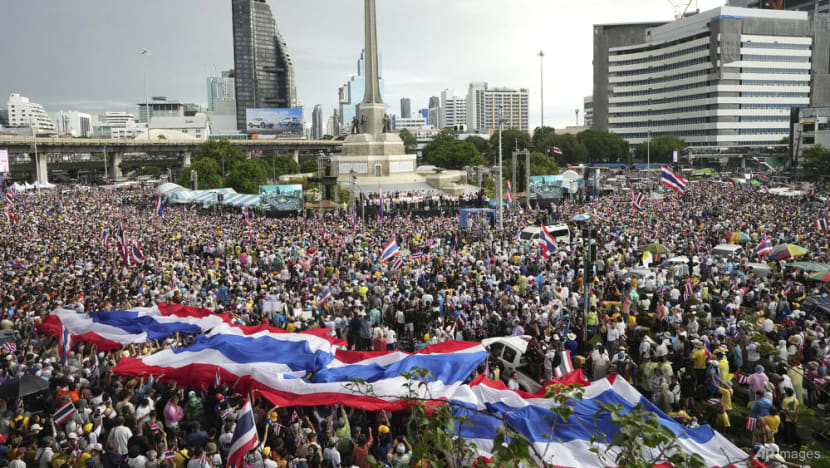Commentary: Thai PM’s suspension threatens more than the Shinawatra legacy
Prime Minister Paetongtarn Shinawatra’s suspension amid an ethics probe into a leaked phone call comes at a bad time, even if Thailand is no stranger to political volatility, says Control Risks’ Harrison Cheng.

Thailand's Prime Minister Paetongtarn Shinawatra, center, speaks to media at the Government House in Bangkok, Thailand, Tuesday, July 1, 2025, (AP Photo/Sakchai Lalit)

This audio is generated by an AI tool.
SINGAPORE: There was a potent sense of deja vu in Bangkok on Tuesday (Jul 1). Thai Prime Minister Paetongtarn Shinawatra, daughter of former leader Thaksin, was suspended from duty by the Constitutional Court, after a petition by 36 senators over her controversial leaked phone conversation with Cambodian Senate President Hun Sen.
Her predecessor Srettha Thavisin had similarly come under the Constitutional Court’s scrutiny, after 40 senators submitted a petition alleging he breached ethical standards by appointing Shinawatra family lawyer Pichit Chuenban to the Cabinet. In August 2024, he was found guilty and dismissed after less than a year in office.
Mr Srettha was the fourth prime minister in 16 years to be removed after a Constitutional Court ruling.
In Ms Paetongtarn’s case, the senators allege that she had breached the constitution and ethical standards for negative remarks about Thailand’s 2nd Army Region commander and for being overly deferential to Mr Hun Sen over an ongoing border dispute.
Ms Paetongtarn now faces the real risk of following in Mr Srettha’s footsteps in the coming months, and with it, possibly the end of the Shinawatra clan’s grip on power. But her family’s political legacy is hardly the only thing being threatened.
FROM IDYLLIC TO IDLE?
Although Bangkok is no stranger to political volatility, the latest round of machinations could not have come at a worse time for the country’s economy.
In mid-June, the World Bank cut its growth forecast for Thailand’s economy from 2.9 per cent to 1.8 per cent in 2025. Three key growth engines are stuttering.
First, tourism. Long the darling of successive administrations, the sector is showing signs of weakness as Thailand faces increased competition from regional neighbours, such as Malaysia and Vietnam.
Chinese visitors, who comprise the single most important subset of international tourists, appear hesitant to flock to Thailand due to safety concerns stemming from scam operations, as well as the October 2023 shooting in Bangkok’s Siam Paragon mall.
Border tensions with Cambodia do not pose direct security risks for travellers in Bangkok, Phuket and other familiar tourist hotspots, but they could add to the sense of unease. The Middle East conflict has also disrupted flights to Southeast Asia and threatens to cast a long shadow over tourism inflows to Thailand in the coming months.
The recent discovery of bombs in Phuket and Krabi have raised concerns about a potential geographical expansion of the separatist insurgency in the far south, though there is little to suggest that this is likely. The nuance may also be lost on tourists less familiar with the insurgency’s track record of containing their attacks within the southern border provinces.
TIGHTER WALLETS AND TARIFF WOES
Second, consumption is being held back by Thailand’s chronically high household debt level, which stood at 87.4 per cent of gross domestic product in the first quarter of 2025. This remains the highest ratio in Southeast Asia.
Commercial banks in 2024 tightened lending criteria for auto and other consumer loans to mitigate risks, which further weakened domestic car sales.
Ms Paetongtarn’s ruling Pheu Thai party has also had to postpone the next phase of its vaunted digital wallet scheme to deal with external economic headwinds, including the threat of the US tariffs. Pheu Thai ministers had earlier promoted the scheme as vital to stimulating domestic consumption, even amid institutional concerns about its viability.
Finally, Thailand’s export-dependent economy is also bracing for the potential impact of US President Donald Trump’s tariffs come Jul 9, when the current window for bilateral trade negotiations expires. Without a deal, Thailand is set to face a staggering 36 per cent tariff rate for exports to the US.
Although Thailand’s Finance Minister Pichai Chunhavajira will kick off formal negotiations with US Trade Representative Jamieson Greer in Washington DC on Jul 3, Thailand was not on a priority list of countries for US talks reported by the Wall Street Journal in April. Indonesia, Malaysia, Vietnam and even Cambodia are reportedly on that list, though it is not clear on what basis they were prioritised.
Thailand therefore risks failing to pin down a favourable deal by Jul 9.
While US Treasury Secretary Scott Bessent has indicated that talks could be extended for certain countries, it remains to be seen if the US is sufficiently convinced that Thailand is “negotiating in good faith” through its pledges to address outstanding concerns, such as the transshipment of Chinese goods and non-tariff barriers to trade.
If Mr Pichai is successful in his endeavour, then the 10 per cent baseline could hold until a deal is struck. If not, and if the US thinks Thailand needs less of a push and more of a shove to prove its sincerity, the higher tariff rate could be used as leverage against Thailand to force more concessions.

CAVEAT EMPTOR
Foreign investors will want to see strong economic management by the government in order to keep their faith in Thailand.
This is where political stability is crucial. An administration teetering on the precipice is unlikely to have the bandwidth to think strategically and long-term about fixing the economy.
Pheu Thai’s flagship initiatives to stimulate foreign investment have also been drawn into the political storm, and they look likely to be put on the backburner for the sake of political survival. Plans to legalise casinos have been delayed, with the Bhumjaithai party firmly in opposition after it withdrew from the ruling coalition.
The casino legalisation bill and the proposed Land Bridge megaproject in southern Thailand, both backed by Pheu Thai, were both mentioned at the anti-government protest at Bangkok’s Victory Monument on Jun 28.
NO EASY FIX
In short, Thailand needs to fix its politics to fix its policies. Unfortunately, there is no silver bullet on the horizon.
It will take restraint and understanding among coalition partners – and the powers that be who are behind them – to prioritise government stability and policy continuity over narrow political interests. This is especially so when the cost of disunity could be catastrophic, not just for the political elites, but for the nation. It would also require novel policy ideas over tried-and-tested populist pitches.
Yet there is little to suggest that Ms Paetongtarn’s government is ready for either. One should note that what sparked the latest round of brinksmanship was Mr Thaksin’s coveting of the interior portfolio – the interior minister position being seen as one of the most powerful roles in government – which so infuriated Bhumjaithai that the latter abandoned the coalition.
Mr Thaksin cannot help but overreach; Ms Paetongtarn cannot help but defer; things are falling apart and it appears that the centre cannot hold.
Harrison Cheng is a Director in risk consultancy firm Control Risks.















